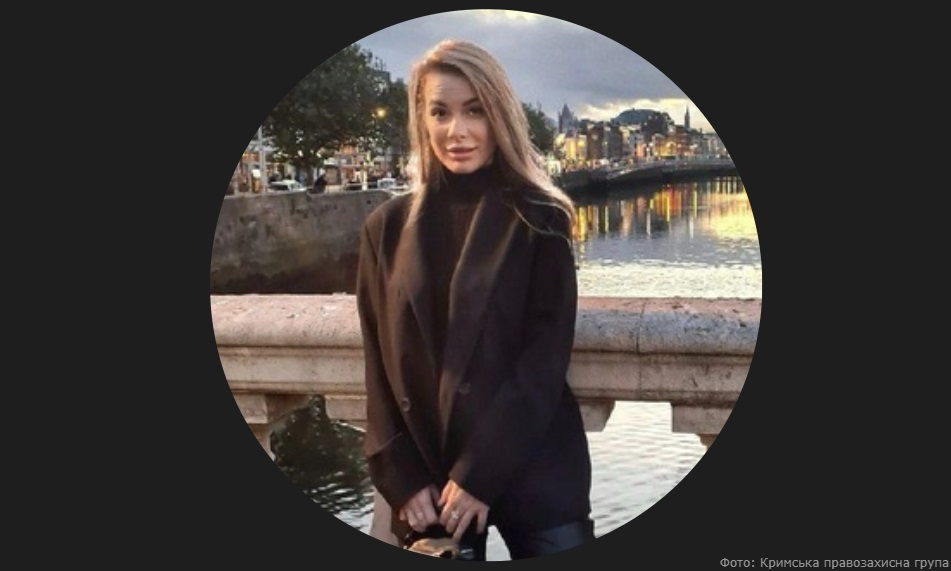In Crimea, the FSB detained local resident Lyudmila Kolesnikova at her mother’s funeral, accusing her of espionage.
In the temporarily occupied Crimea, representatives of the "illegal FSB authorities" detained lawyer Lyudmila Kolesnikova. The occupying authorities accused her of espionage and providing financial assistance to Ukraine for the purchase of digital postage stamps.
This was reported by the Crimean Human Rights Group citing a letter from Kolesnikova, which she sent from the Simferopol pre-trial detention center (SIZO-1).
 Lyudmila Kolesnikova
Lyudmila Kolesnikova Lyudmila Kolesnikova stated that she was born on March 1, 1990. She is a trained lawyer. Since 2022, she had been living in Ireland, where she obtained “temporary protection status.”
In June 2024, she returned to the temporarily occupied Yalta for her mother’s funeral, but was detained by FSB officers right at the cemetery and sent to SIZO №2.
“My parents have died. My sister is in Ukraine and does not help me. I only have my cat left; I begged them to let him go, but they (the FSB officers) did not do that, and he died of hunger. On October 3, 2024, a criminal case was opened against me, and I was placed in custody. Before that, I spent 3 months in detention: without hygiene items, a comb, or underwear. In a room with painted windows, like in Solzhenitsyn's books,” she wrote.
According to her, she was accused of espionage and providing financial assistance to Ukraine amounting to 25 euros. The woman claims that the criminal case under Article 275 of the Criminal Code of the Russian Federation was initiated due to two NFT stamps of the “Russian warship,” which she bought two years ago for 25 euros. She believes that the only evidence in the accusation is an extract from the Revolut banking app.
“What is known today about the NFT stamp ‘Russian warship’ is that it undoubtedly has a political context. This means she is a political prisoner. We hope that international attention will help secure her release,” commented Olga Skripnik, chair of the Crimean Human Rights Group, to Suspilne Krym.
Kolesnikova adds that she has no defense attorney and cannot defend herself from prison.
Recently, Olga Skripnik, chair of the Crimean Human Rights Group, stated that the trend of persecution under the articles of “treason” and “espionage” in Crimea intensified in 2024. Persecution of Crimeans under these articles was occurring even before 2022, but after the full-scale invasion, the number of detentions and convictions based on such fabricated charges has increased.
According to the Crimean Human Rights Group, at least 50 Ukrainian citizens from Crimea are involved in fabricated cases of “treason” and “espionage.”
The Crimean human rights activist also reported that recently, the occupying authorities have been particularly focused on persecuting women, whose numbers among political prisoners have significantly increased since 2022. They are accused of treason and “espionage,” held in strict isolation, and subjected to psychological pressure.
Olga Skripnik recalled the case of Lenia Umierova, which also involved the confiscation of bank cards and attempts to include them as evidence in the criminal case. According to Skripnik, this demonstrates that Russia criminalizes any actions, even those aimed at supporting the civilian population. They are classified as espionage, treason, or cooperation with Ukrainian special services.
Recently, the chair of the Crimean Tatar Resource Center, Eskender Bariyev, reported that his human rights organization faced several issues when documenting war crimes.
In particular, since 2023, the families of political prisoners have tried to conceal the detentions of their loved ones by FSB officers. Russian security forces have blackmailed families with promises of quick release for silence about the arrest of a person. Additionally, those who cooperated with the Crimean Tatar Resource Center began to doubt the advisability of sharing information about prisoners, as many have not yet been released.
Earlier, the Crimean Human Rights Group called on Crimeans to send documents and other evidence confirming the commission of crimes in occupied Crimea.
Recently, ZMINA reported that for Ukrainians living in temporarily occupied territories, the electronic service “You are in Ukraine” was launched: it includes safety and resistance instructions and provides access to a quality VPN and secure browser.